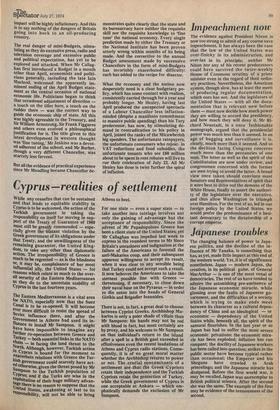Impeachment now
The evidence against President Nixon is now too strong to admit of any course save impeachment. It has always been the case that the law of the United States was over-finicky in its administration, and over-lax in its principle; neither Mr Nixon nor any of his recent predecessors could have survived the twice-weekly House of Commons scrutiny of a prime minister even in the regard of their ordinary practices. Nevertheless, the American system, though slow, has at least the merit of producing regular documentation, which ours has not. And the legislators of the United States — with all the documentation that is relevant now before them — must now decide how much power they are willing to accord the presidency, and how much they will deny it. Mr Richard Neustadt, in a once fashionable monograph, argued that the presidential power was much less than it seemed. In an age of bugging and surveillance it is, clearly, much more than it seemed. And so the decision facing Congress concerns much more than the peccancies of one man. The letter as well as the spirit of the Constitutuion are now under review, and congressmen concerned with the former are men trying to avoid the latter. A broad view once taken should convince most Senators and Representatives of spirit that it were best to drive out the demons of the White House, finally to assert the authority of the legislature over the executive, and thus allow Washington to triumph over Hamilton. For the rest of us, led in our foreign policy by the United States, we would prefer the predominance of a hesitant democracy to the dictatorship of a corrupt emperor.



























 Previous page
Previous page